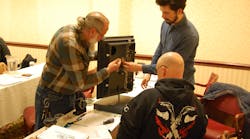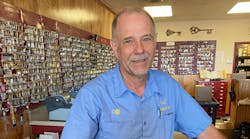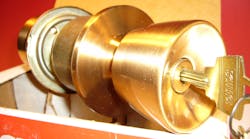It was a hot summer day in Pensacola, Florida, and I was making keys to a Chevrolet Venture. The vehicle belonged to a “caregiver” and was parked in the driveway of one of her clients.
This particular minivan had room only for the driver. The rest looked like something from “Hoarders.” The minivan was filled with what I can describe only as trash. There were cereal boxes, clothing — some in garbage bags and some just scattered around — empty (mostly) fast-food boxes, wrappers and bags. As you can imagine, the aroma was anything but pleasant, and the summer heat was NOT helping.
I worked as fast as I could to get out of that vehicle as quickly as possible when I heard a rustle coming from the pile of trash behind the front passenger seat. Out of the corner of my eye, I saw something brown and a little larger than my thumb leap from the back of the seat into the pile of trash on the passenger seat and burrow quickly out of sight. It was at this moment that I said to myself, “I have GOT to find a better class of customers!”
Upgrade in Clientele
That evening, after a long, hot shower, I set to work on putting together a plan to do more dealership work and less “joe six-pack” work. Dealership work is great work for an automotive locksmith — lots of cars in one place.
The first thing I did was redesign my business card and order a much larger quantity of them. In my days with the “Bill Reed Seminar Group,” I heard Reed tell thousands of locksmiths just how important a good business card was. You always must be prepared to hand out cards to anyone who will take one. Business cards are one of your best and least expensive means of advertising.
I already had seen how well that worked with my existing cards, but I thought I had to up my game and added information on the back of the card that would make people want to keep my card — spaces for “Your Key Code” and “Your Security Code.” After I received the new cards, I filled out the back for almost every job I did and urged the vehicle owner to put the card in their owner’s manual “in case they ever lost their keys again.” In addition, I gave every customer at least two more cards, saying “Take a couple. They’re small, and you can share them with your friends.”
The cards alone wouldn’t get me into dealerships, but they added an extra level of professionalism, and that’s never a bad thing. My next move was to put together a “Dealer Only” price list. In the heading, I stated that these special prices were applicable only if the dealership had a minimum of three vehicles that required my services.
I listed services for nontransponder keys, edge-cut transponder keys and side-milled transponder keys. I also listed “Average Prices” for key generation, with a disclaimer that there was too much variation in transponder systems to provide a flat-rate price, and that exact quotes for particular vehicles were “only a phone call away.”
I then listed the services that I performed, such as proximity keys, remotes and reflashing of modules.
I worked a lot on that list and made sure that it was printed on a single page using print large enough to be easy to read. I also included line drawings of keys and fobs to illustrate the types of keys and fobs that I dealt with arranged around the outside of the page. My main goals were to provide as complete a list of services that I perform but a vague list of prices that were dependent on a three-vehicle minimum.
I had learned years before that most dealerships stop listening to you the moment you use terms such as “service call” or “trip charge” in your billing. By having a three-vehicle minimum, I could eliminate the service charge and simultaneously prevent dealers from calling me for nickel-and-dime work, while encouraging them to give me more real work.
When I had my list and business cards ready, I visited the various dealerships and made my presentation. Instead of going to the dealership owner or manager, I went to the service managers. They really knew the problems associated with lock work and understood the types of services that I provided. It didn’t hurt that I already knew a lot of the local service managers from my days of producing videos, but a lot of the people whom I spoke with had never met me. If the service managers liked what I offered, they would take it to management and normally get me a trial job or two. If management was pleased with the results, I got the account.
I didn’t put on a suit or dress up to meet with the service managers, but I made sure that my work clothes were clean and presentable and that my service truck also looked clean and presentable. I wanted to come across as a professional technician who knew what he was doing.
Getting Paid
One of the biggest hurdles that I’ve had to deal with is making sure that I get paid in a timely manner. Extending credit to the wrong people has caused many excellent technicians to file for bankruptcy, but larger dealerships that have the most money almost never will want to pay you on the spot. With that in mind, my “Price List” didn’t say anything about how I expected to be paid.
For the smaller dealers, and particularly the “buy here pay here” dealers, I told them that I expected to be paid for each job upon completion. For the larger franchise dealers, you pretty much have to take what they offer in the way of payment terms, but there are some advantages to that. If they make the rules, you play by their rules and then they don’t live up to them, that gives you leverage with management to get paid upon completion in the future — particularly after they become dependent on your services.
The trick is that you must have a paper trail, and you must write your invoices clearly and include all of the information that the dealership requires. My best client insists on a separate invoice for each vehicle that includes the full VIN and stock number of the vehicle, even if I make only one nontransponder duplicate key. I typically work at that dealership one day per week and might write 6–10 invoices in a single day. That same dealership pays like clockwork after 30 days.
Another thing Reed used to point out was that there were many great locksmiths, but way too many who were terrible businessmen. I’m sure I would fall into that group if it weren’t for my wife, a CPA. Her help with the accounting end of my business has been invaluable. If you feel the same way that I do about accounting, then you need to hire (or marry) a good bookkeeper.
Some dealerships will require that you not only present them with an invoice for each job, but also send them a statement each billing period. I don’t understand why they do this, but once again, you have to play by their rules. That’s where my bride comes in — by taking copies of the invoices and producing statements for me to mail.
If you deal with a lot of smaller dealerships, you also have to occasionally become a collection agent. It’s just a fact that some small dealerships will do everything they can to not pay you. When that happens, I do the best that I can to collect, but from then on if they want my services, they have to pay on the spot.
The Bottom Line
Dealership business can be good business. You can get that business, but you must be a good technician and a good businessman. I have taken over at dealerships where national chains that have brightly colored vans have been simply because I showed up on time and got the job done.
I’ve never met a car dealer who wanted to be a locksmith. They just want the job done and done properly for what they perceive to be a fair price. Being dependable will be your best and most important asset. Being dependable and getting the job done efficiently will allow you to charge more and earn more.
A print shop that I once used had a sign in their office that said that three things were involved in each transaction: Speed, Quality and Price, and that you could choose any two of those options. In other words, if the dealership wants something done properly and fast, then it will cost more. If you provide the services quickly and professionally, they will pay your prices.
The difficult part is getting in the door to show them what you can do. Then, after you have their business, don’t drop the ball!
Steve Young has been a locksmith since 1973 and has trained and taught locksmiths since 1988. He is a frequent contributor to Locksmith Ledger.






